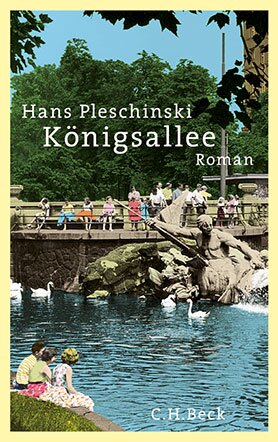Fiction
Königsallee
[The Königsallee]
Hans Pleschinski is one of the few living German authors capable of entertaining his readers while maintaining a high intellectual standard. The Munich-based author, who is also known for his work as an editor, translator and essayist, combines a commitment to educate, sense of style, and an understanding of diverse social milieus with a humane appreciation of his contemporary reader’s need for entertainment and amusement. His most recent novel, Königsallee, a documentary-like fictional episode in the later life of literary giant Thomas Mann, seems an apt example of these qualities: it was both a popular success and it charmed critics who are usually wary of easy and entertaining prose.
This is especially remarkable, given that at the turn of the millennium Thomas Mann’s quirks, his piquant erotic inclinations, and the circus around his troubled family was at the forefront of the media and had been portrayed ad nauseum in: biographies, volumes of his diaries and correspondence, as well as a three-part television series which produced a virtual Mann-Mania, followed by a backlash of total disinterest. Pleschinski owes his ability to add a new and thrilling facet to a rather fortunate coincidence: the author gained access to the estate of Klaus Heuser (d.1994), who played an important role in Thomas Mann's private and literary life.
In the summer of 1927, the poet had met the then 17-year-old on the island of Sylt and subsequently invited him to Munich; the visit was followed by a trip to Heuser's family in Dusseldorf. Thomas Mann later noted that he had felt like a “happy lover,” during that time. He dedicated his “final passion,” to the blond young boy in the beginning of his “Amphitryon” essay, and he served as a model for the main character in the Joseph tetralogy. In August 1954, Mann noted in his diary that the former lover, then a forty-something-year-old merchant, would return home after a long sojourn in East Asia. Shortly thereafter, the 79-year-old Nobel laureate traveled to Dusseldorf for a reading of “Felix Krull.” He did not meet Heuser during that trip. Hans Pleschinski, however, has the beautiful Klaus, accompanied by his Indonesian lover Anwar, stay at the same hotel as Mann. The novel revolves around this fictional reunion, a virtuosic parody of Thomas Mann’s “Lotte in Weimar” (1939), which depicts a fictional reunion between Goethe and his childhood sweetheart Charlotte Kestner.
The “Elephant” in Weimar is the “Breidenbacher Hof” on the Königsallee in Dusseldorf. The grand hotel in both locations provides the setting for a farcical romp in the orbit of a traveling poet laureate. Pleschinski successfully creates a genre painting of the Adenauer era rarely appreciated in contemporary German literature – a cocktail of pastel-colored economic miracle atmosphere mixed with the stench of brown and glossed in malicious irony. Between esprit and caricatured exaggeration, the portraits of minor characters dazzle: Mann’s favorite daughter Erika Mann is depicted as her father’s feisty-egocentric bodyguard, his son Golo as a tragically suffering family buffoon; Thomas Mann’s early admirer and later book burner Ernst Bertram begs for forgiveness for his sins. An embarrassing honorary speech by a former Nazi Field Marshal under a roof with the emigrants, and a beautiful elevator boy named Armand as Krull-revenant, also belong to Pleschinski’s pastiche that unfolds in a wide range of comedic constellations ranging between fact and fantasy. Thomas Mann aficionados can revel in deciphering allusions; but beyond that we are dealing here with a retrospective social novel about the early Federal Republic — an apt substitute for a dry history class.
By Kristina Maidt-Zinke
Kristina Maidt-Zinke is a book and music critic at the Süddeutsche Zeitung and also writes reviews for Die Zeit.


